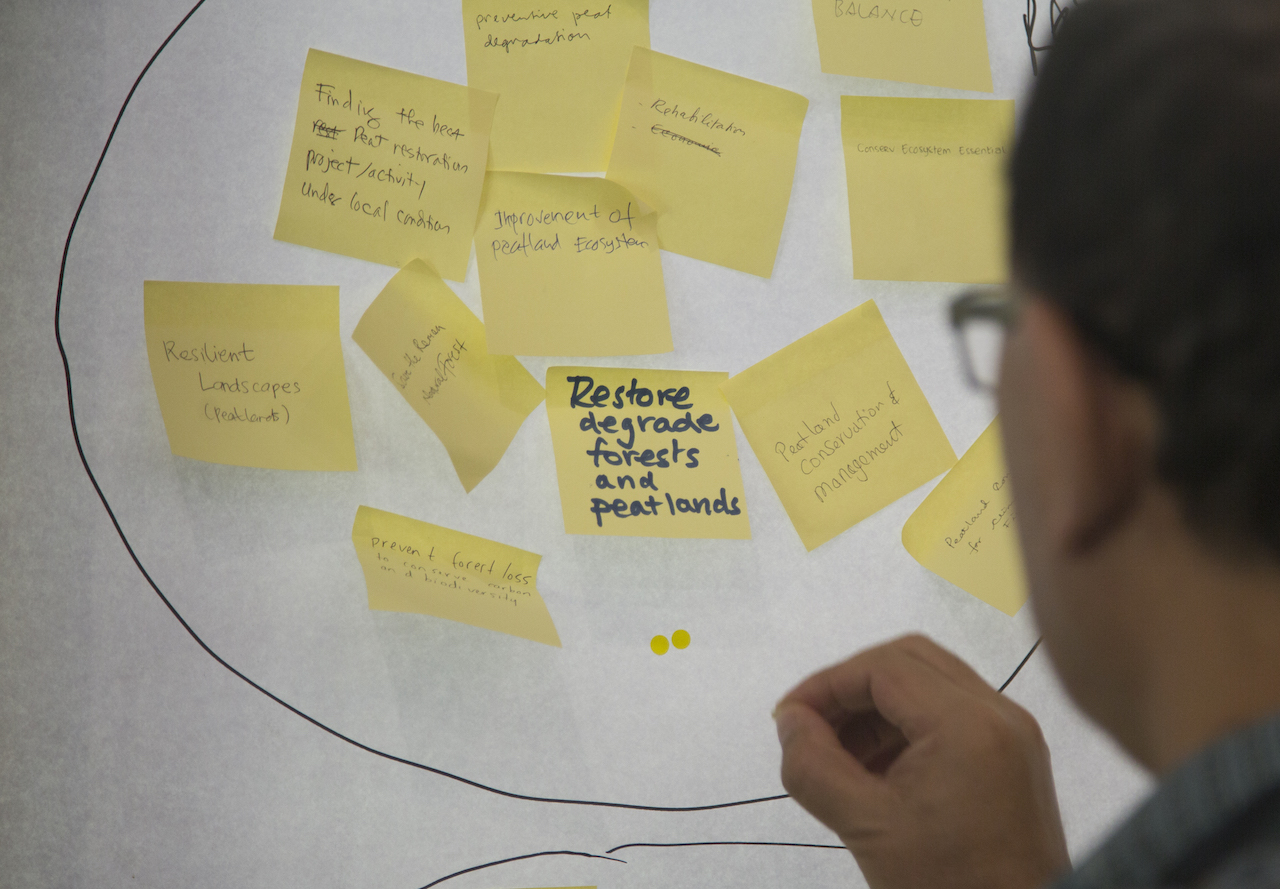
One of the main challenges today in formulating sustainable peatland management policies is that different studies related to peatlands carried out by many researchers, often use different parameters and methods, and are written in different reporting formats. Consequently, results of these studies cannot be applied to other contexts outside the scope of data collection.
During a two-day workshop on 10-11 July 2019, at the ITPC office on the CIFOR campus in Bogor, the International Tropical Peatlands Center (ITPC), the Research, Development and Innovation Agency (FOERDIA) of Indonesia’s Ministry of Environment and Forestry and the Center for International Forestry Research (CIFOR) organized a workshop with the theme “Enhancing Evidence-Based Policy by Developing Core Common Outcomes for Tropical Research and Management”.
Consistent parameters allow better synthesizing, and can then be used as basis for policy formulation and practice in the field. On the flip side, inconsistency in parameters used in different research on peatland creates waste in resources. Prof. Mark Reed from Newcastle University said that efforts are needed to reduce these inefficiencies and improve quality of data and “differences in variables and methods in peat study is a waste in the research process.”
The ultimate goal is to extend consistent approach, along with associated best practice methods and reporting standards. It is hoped that researchers and monitoring initiatives will increasingly choose to collect data using consistent core outcomes, increasing the proportion of data that can be integrated in evidence syntheses and meta-analyses. This way, it should be possible to generate more robust evidence to guide peatland policy and practice internationally.
Core outcomes in tropical peatlands research and monitoring
The workshop discuss how the scientific and practitioner community might be able to collect data to better support evidence-based policy. With the aim of find a way to standardise the collection of environmental data, it is hoped that outputs of multiple studies can be combined into useful syntheses. As part of the UN Global Peatland Initiative, the workshop focused on tropical peatlands and applied the tested approach for peatlands in the UK.
A pre-workshop survey was used to identify the groups of important measures or the ‘outcome sets’ and their associated variables or ‘outcome measures’. The outcome sets are things that we want to know about and outcome measures are what we want to measure. At the workshop, the sets and their associated outcome measures were reviewed and amended to provide a comprehensive list of outcomes that could be measured in tropical peatlands across carbon, biodiversity and hydrology or ‘the proposed core areas’.
Workshop participants also identified three policy objectives relevant to tropical peatlands, that is climate mitigation; social and economic, and sustainable management; and protection and restoration. These objectives will be used in a post-workshop multi-criteria analysis to identify the most important or core outcome sets and their related outcome measures.
Peatland mapping
Since the launch of ITPC in October last year, various studies related to tropical peatlands have been carried out to support the initial stages of the center’s operations, including in data and information collection. This workshop is an effort to develop general results and core reporting standards, in peatland research and monitoring to strengthen scientific policies.
The ITPC will take the lead in this effort by organizing joint events and publications with international researchers in line with the Global Peatlands Initiative framework. The ITPC can take up the role as a center of information related to peatlands. For example, activities carried out in Peru or Congo can be posted on the ITPC website for the public to access.
In the issue of GHG accounting and measurement, reporting and verification (MRV) methodology, the meeting agrees for countries to their share experiences and support joint publications, where further emphasis should be placed on peatland mapping as a basis for understanding the role of peatland in the resilience of the ecosystem.
Reaching beyond the research community
To achieve better understanding and information as basis for sustainable peatland management, the discussions need to include broader stakeholders outside the current discussion group to achieve broader results. These discussions especially need to emphasis issues that are closely related to peatlands such as fire, tenure, stakeholders related to peatlands, by respective governments that manage peatlands.
Further detailed research related to payment mechanisms for local communities and stakeholders in their role on peatland management was also identified as an area that will be explored. While in GHG accounting on peatlands, limited scientific publications was identified as one of the main issues. The ITPC aims to increase the number and quality of scientific writing related to peatlands.
In the move to further support the studies on tropical peatlands, ITPC can take a role as host for student internships from various countries. The IFSA network can also be used for online training and monitoring tropical peatlands, and to assist in the collection and use of tropical peatlands data.
Science contact
For further information on the topics discussed in this article, please contact Haruni Krisnawati at harunikrisnawati@gmail.com or Mark Reed at Mark.Reed@newcastle.ac.uk









